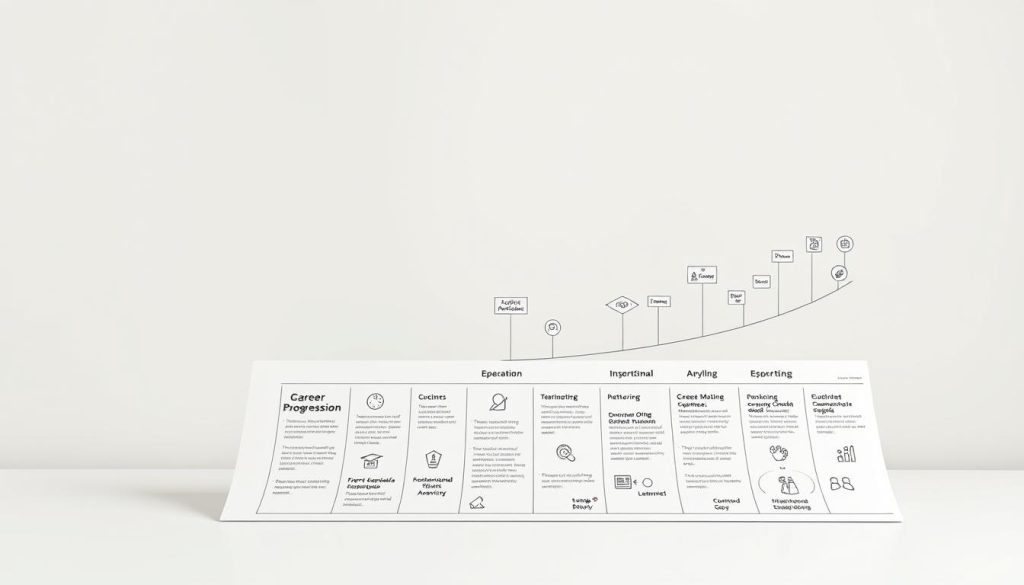As an independent professional, navigating your career path can be both exciting and daunting. Without the structured frameworks of traditional employment, you must take ownership of your career development, making strategic decisions that foster growth and stability.
The journey of an independent professional is marked by unique challenges and opportunities. Your career progression depends on your ability to adapt, continuously develop your skills, and expand your professional offerings. This requires a proactive approach to professional development, ensuring you remain competitive and relevant in a rapidly changing market.
By adopting a strategic mindset towards your career, you can achieve greater financial stability and professional satisfaction. It’s about balancing immediate needs with long-term development goals, setting measurable milestones, and continuously assessing your market positioning.
Table of Contents
Key Takeaways
- Understand the unique challenges and opportunities of your career progression as an independent professional.
- Take ownership of your professional development through intentional planning.
- Balance immediate client needs with long-term career growth objectives.
- Expand your service offerings and develop specialized expertise.
- Establish measurable milestones for your career advancement.
Understanding Career Progression for Independent Professionals
In the ever-evolving landscape of independent work, career progression requires a proactive and adaptable approach. Unlike traditional employment, where career advancement is often linear and defined by organizational structures, independent professionals must chart their own course.
Career progression for these individuals involves a nuanced understanding of personal and professional development. It’s about expanding expertise, increasing market value, and achieving greater work autonomy.
Defining Career Progression Beyond Traditional Employment
For freelancers and consultants, career progression extends beyond traditional metrics like promotions or title changes. It encompasses multiple dimensions, including financial advancement, skill expansion, and work-life balance optimization. Independent professionals experience career growth through various means, such as taking on new challenges, diversifying their services, or enhancing their professional reputation.
Why Career Progression Matters for Freelancers and Consultants
Career progression is crucial for independent professionals as it directly impacts their earning potential, work satisfaction, and long-term sustainability in competitive markets. Without intentional career development planning, freelancers risk stagnation and declining relevance. By understanding their unique career path, independent professionals can take ownership of their professional trajectory, making informed decisions that drive their career development.
Ultimately, successful career progression for independent professionals requires a self-directed approach, regular reassessment of goals, and a commitment to ongoing development. By adopting this mindset, freelancers and consultants can navigate their careers with confidence and achieve lasting success.
Assessing Your Current Professional Position

Before charting your next career move, it’s essential to assess your current professional position accurately. This involves a comprehensive evaluation of your skills, experience, and market value, as well as identifying potential growth opportunities in your industry.
Skills, Experience, and Market Value
Conducting a thorough skills inventory is the first step in this assessment. This requires an honest evaluation of both your technical capabilities and soft skills. For instance, you might consider creating a table to map your skills against industry standards.
| Skill Category | Current Proficiency | Industry Standard |
|---|---|---|
| Technical Skills | Advanced | Expert |
| Soft Skills | Intermediate | Advanced |
Benchmarking your experience against industry standards helps you understand your competitive positioning in the workforce. Analyzing recent client projects and researching industry compensation trends for similar services can help determine your current market value.
Identifying Growth Opportunities
Your career trajectory should be evaluated based on year-over-year growth in key metrics like client quality, project scope, and income stability. Identifying skill gaps between your current capabilities and your desired professional position is crucial for prioritizing learning and development investments. For more insights on career development, you can explore resources like career development strategies.
Regularly auditing your service offerings against emerging industry needs helps identify growth opportunities before they become mainstream. This proactive approach ensures you remain competitive in your current role and prepared for future job opportunities.
Creating a Strategic Career Progression Plan

A well-structured career progression plan is the backbone of a successful independent career, providing direction and focus. For independent professionals, such a plan is not just beneficial; it’s essential for navigating the unique challenges and opportunities of their career paths.
Setting SMART Career Goals as an Independent Professional
Setting Specific, Measurable, Achievable, Relevant, and Time-bound (SMART) goals is crucial for tracking progression in an independent career. This approach provides a clear framework where traditional benchmarks are absent. For instance, an independent professional might aim to expand their professional network by connecting with a certain number of people on LinkedIn within the next six months. Achieving Objectives and Key Results (OKR) by learning new skills and improving work efficiency is another example of setting SMART goals.
Effective career development plans for freelancers typically include financial targets, skill acquisition timelines, client diversity goals, and personal brand development milestones. Breaking down career progression into quarterly objectives that align with annual and five-year vision statements also benefits independent professionals.
| Goal Type | Example | Timeline |
|---|---|---|
| Financial Targets | Increase income by 20% | Next 12 months |
| Skill Acquisition | Learn Python programming | Within 6 months |
| Client Diversity | Acquire clients from 3 different industries | Within 9 months |
Developing Measurable Milestones for Your Career Journey
Developing measurable milestones is critical for assessing progress and staying committed to your career development plan. These milestones should include both quantitative metrics, such as income growth and client retention rates, and qualitative achievements, like industry recognition and work satisfaction.
Creating accountability mechanisms, such as peer mastermind groups or professional coaches, helps independent professionals stay on track with their development plans. Regular review periods should be incorporated into the career progression strategy to adjust goals and tactics based on market changes and personal discoveries.
Documenting your career plan creates a reference point for decision-making when new opportunities arise that might divert you from your core progression strategy. By establishing clear progression indicators, independent professionals can signal when they’re ready to raise rates, expand services, or pivot their business model.
Essential Skill Development Strategies for Career Progression

To achieve career progression, independent professionals must prioritize strategic skill development. This involves a dual focus on enhancing technical skills and soft skills to create a well-rounded service offering.
Technical Skills That Advance Independent Careers
Technical skills advancement is critical for independent professionals. It should focus on both deepening core competencies and acquiring adjacent capabilities that expand service potential. Technical skill development should be informed by industry trends, client needs analysis, and emerging opportunities in the field.
Some key technical skills include:
- Deepening core competencies in your area of expertise
- Acquiring adjacent capabilities to expand your service offerings
- Staying updated with the latest industry trends and technologies
Soft Skills That Differentiate Top Independent Professionals
Soft skills like negotiation, client management, and strategic communication often differentiate top-earning independent professionals from their peers. Enhancing these skills can lead to better client relationships and more effective project management.
Key soft skills include:
- Leadership and team management
- Risk analysis and problem-solving
- Strategic communication and negotiation
Effective training strategies for freelancers include a mix of formal courses, peer learning, client project challenges, and self-directed study. Creating a personalized learning roadmap helps independent professionals make strategic investments in skills that offer the highest return on investment for their specific career goals.
By balancing immediate skill needs with long-term capability development, independent professionals can remain competitive as markets evolve. The most successful freelancers and consultants approach learning as an ongoing business investment rather than a sporadic activity.
Building a Professional Brand That Supports Career Growth
As independent professionals navigate their career progression, building a strong professional brand becomes essential. This process involves more than just creating a logo or a website; it’s about crafting a consistent narrative that communicates your unique value proposition and expertise.
Your professional identity should evolve alongside your career growth, reflecting new capabilities, higher-level positioning, and increased market authority. Personal growth and professional development are intertwined for independent professionals, as client relationships often depend on both technical expertise and personal connection.
Crafting a Compelling Professional Narrative
Effective brand building requires identifying your unique professional story—the journey, values, and experiences that differentiate you from competitors. This narrative should be consistently communicated across all platforms to build a strong professional brand.
Leveraging Digital Platforms for Professional Visibility
Digital platforms provide independent professionals with unprecedented opportunities to demonstrate expertise, share insights, and build visibility with potential clients. Content creation strategies should align with your career progression goals, targeting the clients and opportunities you want to attract in your next development phase.
To maintain a strong professional brand, independent professionals benefit from creating a strategic personal brand audit schedule. This ensures their public presence accurately reflects their current capabilities and aspirations, maintaining consistency across multiple channels while maintaining authenticity and subject matter authority.
The most successful independent professionals view brand building as an ongoing process of refinement rather than a one-time marketing exercise. This approach enables them to adapt to changes in their industry and continue to advance in their career.
Networking and Relationship Building for Independent Professionals
Building a strong professional network is crucial for career progression in the independent professional landscape. As a solo practitioner, your network can provide valuable guidance, support, and opportunities that are essential for advancing your career. Effective networking involves more than just expanding your contact list; it’s about cultivating meaningful relationships that can lead to new opportunities and collaborations.
Effective Networking Strategies
Strategic networking for independent professionals differs significantly from traditional corporate networking. It focuses on building reciprocal relationships rather than transactional connections. To achieve this, independent professionals should identify the specific people, communities, and organizations that align with their career progression goals. Developing a systematic approach to networking that includes regular outreach, relationship nurturing, and value exchange is also crucial.
- Attend networking events to connect with like-minded professionals and potential collaborators.
- Leverage platforms like LinkedIn to reach out to people in your industry.
- Craft personalized cold emails to initiate meaningful connections.
Cultivating Client Relationships
Cultivating client relationships is another vital aspect of career advancement for independent professionals. This involves going beyond project delivery to provide strategic value-adding interactions that position you as a trusted advisor rather than just a vendor. By doing so, you can build long-term relationships with clients and companies, leading to repeat business and referrals that drive your career progression.
To maximize the benefits of networking and relationship building, independent professionals should view these activities as long-term investments in their career ecosystem. By doing so, they can create a robust network that supports their professional growth and opens up new opportunities for advancement.
Financial Planning as a Career Progression Strategy
As independent professionals navigate their career paths, financial planning emerges as a crucial strategy for progression. Effective financial planning enables these professionals to make informed decisions that support their career goals, ensuring sustainable growth and development.
Setting Rates That Reflect Your Growing Expertise
Strategic rate setting is essential for independent professionals to reflect their increasing expertise and market value. This involves understanding the market rate for your services and establishing a clear progression path that ties rate increases to measurable improvements in expertise, efficiency, and client outcomes.
- Develop a systematic approach to rate increases based on your growing capabilities and results.
- Understand the market value of your expertise to set competitive rates.
A well-planned rate setting strategy not only enhances your financial stability but also supports your career progression by ensuring that your compensation reflects your value to clients.
Investing in Your Professional Development
Investing in professional development is critical for career progression, requiring a view of training, education, and coaching as business investments with expected returns. Creating a dedicated budget for growth-related investments ensures that professional development remains a priority, even during revenue fluctuations.
| Investment Area | Expected Outcome | Impact on Career Progression |
|---|---|---|
| Training and Education | Enhanced Skills and Knowledge | Increased Expertise and Market Value |
| Coaching and Mentoring | Improved Business Strategies and Decision Making | Better Client Outcomes and Career Advancement |
| Technology and Infrastructure | Increased Efficiency and Productivity | Enhanced Service Quality and Client Satisfaction |
By integrating financial planning into your career progression strategy, you can make calculated risks that accelerate your growth while maintaining overall business stability. This approach enables you to pursue strategic opportunities, invest in your development, and achieve long-term success as an independent professional.
Conclusion: Sustaining Long-Term Career Progression as an Independent Professional
Sustaining a successful career as an independent professional requires a holistic approach that integrates personal and professional growth. This integration creates a foundation for long-term career progression and overall life satisfaction.
To achieve this, independent professionals must develop systems and habits that support continuous growth, even during challenging market conditions. This involves approaching career development as a cyclical process of assessment, planning, implementation, and reflection.
Key strategies include:
- Balancing immediate client needs with strategic investments in future capabilities.
- Developing a growth mindset that views challenges as learning opportunities.
- Establishing regular career review practices to stay aligned with personal values and market evolution.
- Cultivating resilience strategies to navigate the ups and downs of independent work.
By adopting these strategies, independent professionals can create a sustainable career path that supports both short-term success and long-term career sustainability.
FAQ
What are the key elements of a successful development plan for independent professionals?
A successful development plan for independent professionals includes setting SMART goals, identifying areas for skill development, and creating measurable milestones to track progress. It also involves assessing your current role, industry trends, and market value to inform your strategy.
How can I assess my current professional position and identify opportunities for growth?
To assess your current professional position, evaluate your skills, experience, and market value. Identify growth opportunities by analyzing industry trends, assessing your competition, and seeking feedback from clients or peers. This will help you create a clear understanding of your strengths and areas for development.
What role does skill development play in achieving career goals?
Skill development is crucial for achieving career goals as an independent professional. It enables you to stay competitive, adapt to changing industry demands, and deliver high-quality services to clients. Focus on developing both technical skills and soft skills, such as leadership, communication, and time management, to advance your career.
How can I create a professional brand that supports my career growth?
To create a professional brand that supports your career growth, craft a compelling narrative that showcases your expertise, values, and unique value proposition. Leverage digital platforms, such as LinkedIn or a personal website, to increase your visibility and demonstrate your skills to potential clients or partners.
What strategies can I use to build a strong network as an independent professional?
To build a strong network, use strategic networking approaches, such as attending industry events, joining professional organizations, or participating in online communities. Cultivate client relationships by delivering exceptional service, communicating effectively, and providing value beyond the initial project.
How can I invest in my professional development as an independent professional?
Investing in your professional development involves setting aside time and resources to enhance your skills, knowledge, and expertise. This can include taking courses, attending workshops or conferences, or working with a mentor or coach to address specific development needs.





